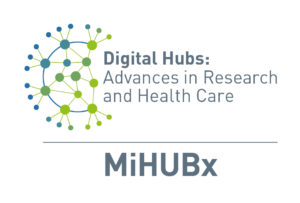MiHUBx: a digital ecosystem for research, diagnostics and therapy
About the project

The aim of the MiHUBx project is to develop and implement an intersectoral and service-related infrastructure to allow for an efficient collaboration of various health care providers, patients and other organizations. The implementation of the approach can contribute to a significant increase in (disease-specific) cooperation across sectors. In this manner, the objectives of the MiHUBx are
- to unlock the data and knowledge generated at non-university sites for intersectoral research, based on the methods and tools of the MII in combination with the Telematics Infrastructure (TI) and electronic health platforms;
- to enable the translation of methods and tools of the MII into regional care, such as the support of clinical studies and decision support; and
- to ensure participation by leveraging digital competencies through educational and best practice to assure an efficient, research-based patient/public engagement and recruitment to MiHUBx digital health interventions.
Use Cases
The development of MiHUBx is guided by three use cases: Diabetic eye, pandemic management and personalized cancer medicine:
Diabetic eye disease
As a result of diabetes mellitus, for example, the retina can be damaged, initially imperceptibly, which can lead to blindness in the further course of the disease. Experts estimate that the number of people with diabetic eye disease (DED) will increase sharply in the coming years due to the age structure of the population, while the number of ophthalmology specialists will decline, especially in rural areas. For the detection and treatment of diabetic eye diseases, a decision support system is therefore to be developed and evaluated in Use Case 1, which has the potential to identify the best diagnostic and therapeutic options per patient. For this purpose, important ophthalmological and diabetological data sets will be combined for practical use and, in addition, new data will be obtained for future studies.
Pandemic Management and Regional Health Monitoring
The care planning of hospitals in the event of severe health crises requires an automated, up-to-date, supra-regional to nationwide forecast of the occurrence of the disease. Of utmost relevance are statements on bed utilisation and treatment capacities, with special attention to intensive care medicine.
Use Case 2 will expand the DISPENSE planning support system developed at Dresden University Hospital and used throughout Saxony and link it with applications and data from the MIRACUM medical informatics consortium. A system that was already developed at the beginning of the COVID 19 crisis and combines the bed capacities of hospitals in Saxony with current infection figures and forecasts for the course of the next two weeks, as well as providing support for current planning to the control centres at the university hospitals in Dresden, Leipzig and at Chemnitz Hospital and to the crisis management team. Based on this, relevant information points are networked in Use Case 2. In future, this will enable faster patient allocation, but also support research into infection processes and the spread of pathogens.
Personalized cancer medicine
Personalized cancer medicine and the focus of Use Case 3 aim both to support medical professionals through digital networking and data exchange and to empower patients. The technical networking of all participants increases the availability of necessary information. This applies to specialists in private practice, specialized staff at the National Centre for Tumour Diseases Dresden (NCT/UCC) as well as to patients themselves. For example, specialists in private practice could dial directly into the molecular tumour boards of the NCT/UCC and discuss the latest study results and possible treatment approaches with specialists. People affected by cancer should be able to actively participate in the course of treatment by means of an app and help shape their own path through the disease and therapy.
Another aim of Use Case 3 is the rapid and comprehensive documentation of special patient data after broad molecular testing. The focus here is on supporting the development and assessment of novel biomarkers that can be used to classify cancers more clearly and tailor therapy approaches more precisely to the individual patient.
Thus, diagnosis and treatment approaches within oncology are to be further professionalized and advanced in the course of the MiHUBx project.
Head of the Digital Hub

Prof. Dr. Martin Sedlmayr
Head of the Digital Hubs MiHUBX
Institute for Medical Informatics and Biometry | Technical University Dresden – Medical Faculty Carl Gustav Carus

